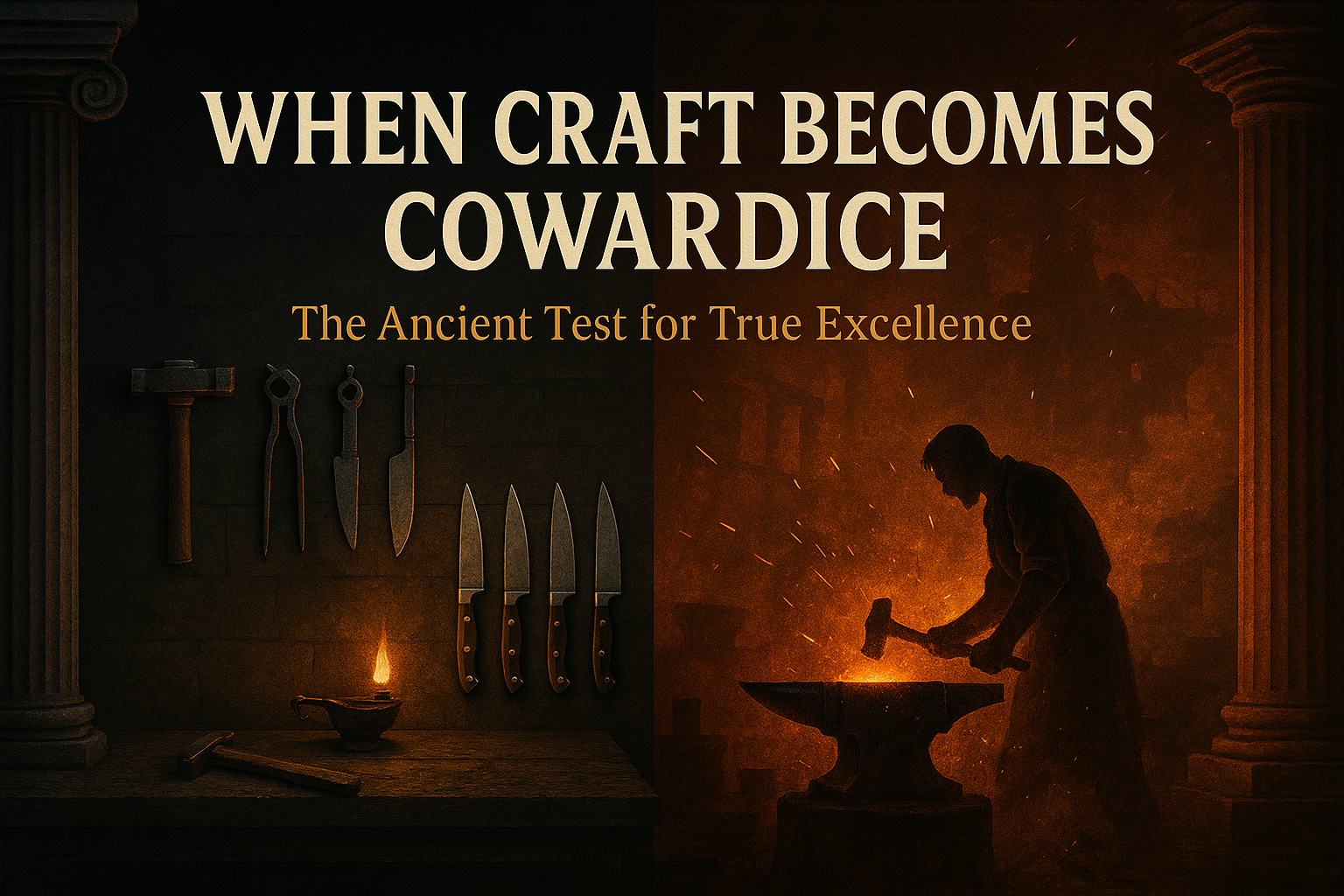
When Craft Becomes Cowardice: The Ancient Test for True Excellence
By Derek Neighbors on July 25, 2025
Jason Fried’s knife-maker defense sounds perfectly reasonable.
Hey master bladesmith, you’ve made a dozen knives this year. Same as last year. Same as the last 20. If you love metal so much, why not help build a battleship? Think of all that metal!
That would be a ridiculous line of questioning. So why is it persuasive in tech?
Fried’s defending the knife-maker’s right to stay focused. But what if his defense is protecting something darker? What if your “disciplined focus” is just fear dressed as virtue?
Aristotle wouldn’t let you off the hook with Fried’s reasoning. He’d cut through the bullshit with one brutal question: Are you attempting things proportional to your actual capabilities?
The Ancient Test That Exposes Everything
In the Nicomachean Ethics, Aristotle describes megalopsychia, great-souledness. It’s the virtue of attempting great things when you have great capability. Not because you want to feel important, but because your capabilities demand it.
The great-souled person doesn’t attempt things beyond their capability (that’s vanity). But they also don’t attempt things beneath their capability (that’s mikropychia, small-souledness). They attempt things proportional to what they can actually do excellently.
Here’s where most people lie to themselves: They systematically underestimate what they’re capable of because admitting their true capability would demand action. Your ego protects your small-souledness by whispering “You’re not ready” when the real vice is refusing to test your limits.
The knife-maker who has the skill to build battleship components but refuses because “I’m focused on knives” isn’t practicing virtue when the city is under siege. He’s practicing sophisticated cowardice. His capabilities demand more, but his comfort demands less.
You’re not “focusing”, you’re hiding from the siege because battleships demand accountability knives never will.
When Craft Becomes Expensive Fear
Stop pretending that “staying in your lane” is excellence when it’s just terror dressed as discipline.
The brutal truth: Most people spend their entire careers perfecting work that’s beneath their actual capability because bigger work means bigger failure, and bigger failure means everyone sees you bleed.
You know exactly what capability you’re downplaying. You know exactly what you could attempt if you stopped protecting your comfortable craft. The voice in your head isn’t telling you to be realistic, it’s begging you to stay safe.
Marcus Aurelius wrote:
What is not good for the hive cannot be good for the bee.
Individual excellence that serves only individual comfort is vice masquerading as virtue.
The capability test: What capability are you downplaying because proving it would upend your comfortable craft?
The mortality test: If you had one year left, would you keep perfecting your current work or finally attempt what you’ve been avoiding?
The siege test: When the city burns, does your craft serve the crisis or serve your need for safety?
These questions expose the difference between excellence and expensive fear.
The Vice of Small-Souledness
Here’s what Aristotle understood that modern culture misses: Small-souledness isn’t just missed opportunity. It’s moral failure.
When you have the capability to build battleships but choose to perfect knives because knives feel safer, you’re stealing from the world. Every day you spend in comfortable mastery while avoiding what your capabilities actually demand is a day you’re choosing cowardice over virtue.
The cost isn’t just to you. It’s to everyone who needed what only you could have built.
But vanity isn’t the answer either. The startup founder who pivots from profitable software to “revolutionizing healthcare” without medical expertise isn’t practicing great-souledness. He’s gambling with lives to feel important. That’s ego-driven expansion disguised as service.
Elon Musk went from payments to rockets to energy because his capabilities demanded it. The world needed what he could uniquely provide at scale. That’s megalopsychia in action, capability meeting consequence, not ego meeting opportunity.
The Questions That Cut Through Your Lies
Strip away the philosophical justifications. Strip away the virtue signaling about “craft focus.” Answer honestly:
Are you expanding because your capabilities demand it, or because bigger feels more important?
What would you attempt if failure meant learning instead of humiliation?
What assumption about your own capabilities are you protecting, and what fear is that assumption serving?
The sleepless nights aren’t about technical problems. They’re about whether you’re serving your capabilities or serving your need for safety. That internal questioning isn’t weakness, it’s wisdom demanding honest assessment of what you’re actually capable of versus what you’re comfortable attempting.
Final Thoughts
The knife-maker vs. battleship question isn’t answerable in the abstract. Excellence demands brutal honesty about your actual capabilities and what the world actually needs from them.
Sometimes the knife-maker needs to build battleships. Sometimes the battleship-builder needs to make perfect knives. What matters is whether you’re choosing from courage or from cowardice.
Aristotle’s test still works: Are you attempting things proportional to your actual capabilities, or hiding behind comfortable mastery?
Name one capability you’re underestimating and the fear protecting it. Write the first sentence of the email you’d send if you were done hiding from what you could actually build. Send it today.
Because the ancient Greeks knew: What matters isn’t whether you succeed or fail. What matters is whether you had the courage to attempt what your capabilities actually demand.
Admit the capability you’re squandering today, or accept small-souledness as your legacy.
Ready to stop hiding behind comfortable craft? MasteryLab.co, where capability meets courage in the pursuit of excellence.



